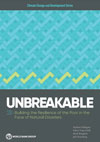-
Predicting the Geopolitical Landscape of 2035, and a More Holistic Measure for Disaster Risk Assessment
November 24, 2016 By Sreya Panuganti The world of 2035 will be facing global and regional insecurities that could be “more dangerous than the second half of the Cold War era,” according to a 2016 report from the Atlantic Council. Global Risks 2035: The Search for a New Normal, authored by Mathew J. Burrows, formerly the principal drafter of the National Intelligence Council’s “Global Trends” series of quadrennial reports, asserts that given geopolitical and technological trends, the world of 2035 is set to be multipolar – and this fragmentation could easily transform into conflict, pitting states like China and Russia against the United States, Europe, and Japan. With this shift in world order as a backdrop, Burrows writes that developing countries will also contend with existential challenges driven in part by climate change, such as increased water and food scarcity and exacerbated social instability. Developed countries will face their own challenges as they grapple with aging populations and the security risks of rapidly advancing technology. The report emphasizes the need for world leaders and policymakers to understand the spillover effects of these interrelated global trends and take proactive measures to ensure the prosperity and safety of our world.
The world of 2035 will be facing global and regional insecurities that could be “more dangerous than the second half of the Cold War era,” according to a 2016 report from the Atlantic Council. Global Risks 2035: The Search for a New Normal, authored by Mathew J. Burrows, formerly the principal drafter of the National Intelligence Council’s “Global Trends” series of quadrennial reports, asserts that given geopolitical and technological trends, the world of 2035 is set to be multipolar – and this fragmentation could easily transform into conflict, pitting states like China and Russia against the United States, Europe, and Japan. With this shift in world order as a backdrop, Burrows writes that developing countries will also contend with existential challenges driven in part by climate change, such as increased water and food scarcity and exacerbated social instability. Developed countries will face their own challenges as they grapple with aging populations and the security risks of rapidly advancing technology. The report emphasizes the need for world leaders and policymakers to understand the spillover effects of these interrelated global trends and take proactive measures to ensure the prosperity and safety of our world. Recently released by the World Bank, Unbreakable: Building the Resilience of the Poor in the Face of Natural Disasters finds that extreme natural disasters cost the global economy $520 billion in lost consumption each year – 60 percent higher than any previous estimate. Traditional disaster risk assessments have focused solely on aggregate losses, or how “disasters affect people wealthy enough to have wealth to lose.” But, as the report points out, a dollar in losses does not mean the same thing to the wealthy as it does to the poor. Instead, the report uses a new measurement that moves beyond asset losses to estimate a community’s socioeconomic resilience – or the ability to resist, absorb, accommodate, and recover from the effects of a hazard in a timely manner. By underscoring the urgency for adopting policies to protect the most vulnerable, such as early warning systems, insurance policies, and social protection systems, the gain in improved wellbeing would be equivalent to a $100 billion increase in annual global consumption.
Recently released by the World Bank, Unbreakable: Building the Resilience of the Poor in the Face of Natural Disasters finds that extreme natural disasters cost the global economy $520 billion in lost consumption each year – 60 percent higher than any previous estimate. Traditional disaster risk assessments have focused solely on aggregate losses, or how “disasters affect people wealthy enough to have wealth to lose.” But, as the report points out, a dollar in losses does not mean the same thing to the wealthy as it does to the poor. Instead, the report uses a new measurement that moves beyond asset losses to estimate a community’s socioeconomic resilience – or the ability to resist, absorb, accommodate, and recover from the effects of a hazard in a timely manner. By underscoring the urgency for adopting policies to protect the most vulnerable, such as early warning systems, insurance policies, and social protection systems, the gain in improved wellbeing would be equivalent to a $100 billion increase in annual global consumption.Sources: Atlantic Council, World Bank.
 A Publication of the Stimson Center.
A Publication of the Stimson Center.





